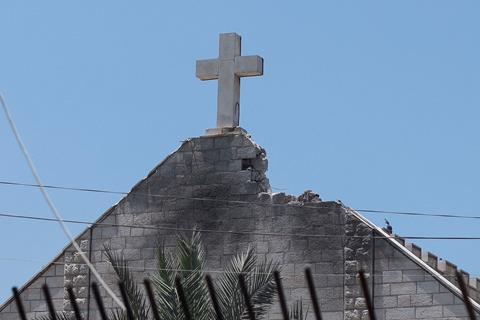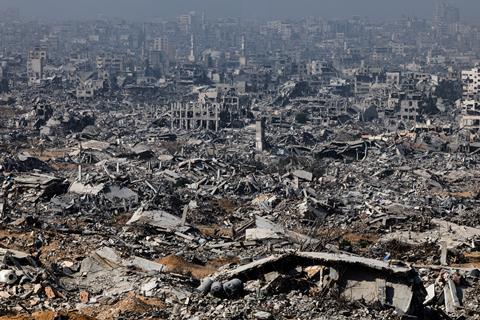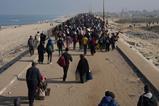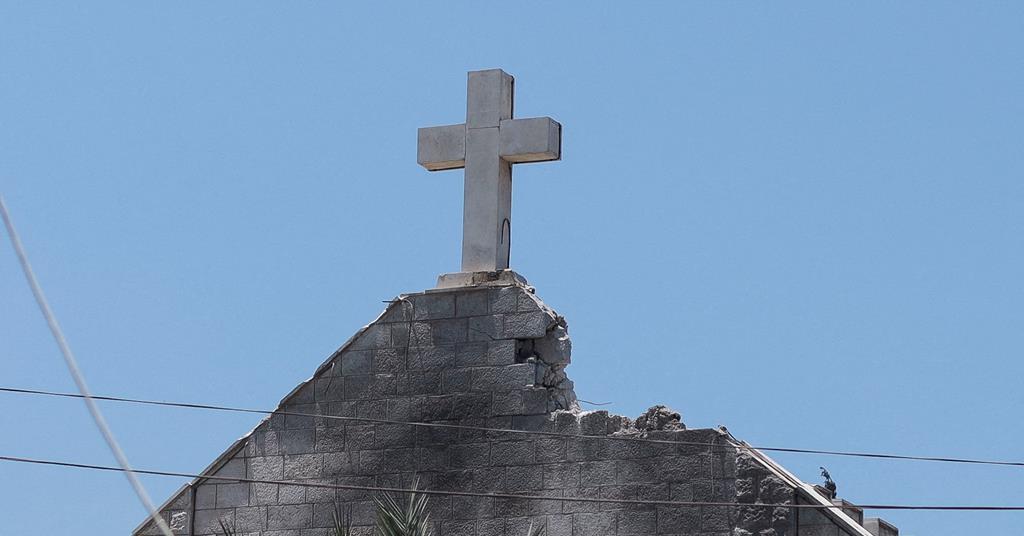Premier Christianity uses cookies Read our cookie policy.
By 2025-11-14T16:26:00+00:00
As Gaza’s fragile ceasefire hangs by a thread, the territory’s 1,000 Christians – many of whom have spent two years sheltering in bombed churches – must decide whether to flee to safety or stay in the land where Christianity was born
The damage at the Holy Family Church, Gaza City which was hit in an Israeli strike on 18 July 2025 (Reuters)
As the fragile ceasefire between Israel and Hamas faces ongoing tests, a man named Elias al-Jalda in Gaza City is grappling with a question that isn’t making headlines: Will his community survive?
That calculation has become starker in recent days, and the hope of reconstruction feels precarious as ever. For Gaza’s approximately 1,000 Christians – many of whom spent two years sheltering in churches that were themselves bombed during the conflict – the choice has become urgent: flee now while there’s a window, or stay?
For the past two years, SAT-7 has maintained contact with Gaza’s Christian population through satellite television broadcasts and local contacts. What we’ve heard from viewers like Elias offers a perspective on this conflict that rarely makes the headlines: the story of an ancient Christian community deciding whether it has a future in the land where Christianity was born.
Gaza’s Christians are a tiny fraction of the territory’s 2.3m people, all of whom have endured devastating loss. But their story offers a sobering look at a community small enough that its complete disappearance is now imaginable.
Elias’ home was destroyed at the beginning of the war. For most of the past two years, he and his family have lived at the Holy Family Church, alongside hundreds of other Christians, sleeping on mattresses arranged in groups of relatives and acquaintances.
“We forgot what normal life looks like,” he told SAT-7 ARABIC’s programme You Are Not Alone recently. “For two years, there’s no gas, no fuel for electricity. Water and food are hard to come by.”
I am committed to remaining on the land of Jesus Christ
The statistics are staggering. Over 80 per cent of Gaza’s buildings have been damaged or destroyed, according to the UN. But statistics don’t capture what Elias described; the peculiar intimacy of the crisis or how families who barely knew each other before the war have “become closer, getting to know each other better than ever” through shared suffering in church shelters.
On 17 July, that suffering became acute when the Holy Family Church was hit in a strike that killed three people. Christians at Saint Porphyrius Church endured even worse – an airstrike that claimed 20 lives, including 18 Christians.
Now, with concerns about whether the ceasefire will last – as well as the reality that huge swathes of land have been reduced to rubble and basic infrastructure needs to be completely rebuilt – these survivors face an agonisingly uncertain future. “Unfortunately, many Christians in Gaza have left already, and more are waiting to leave,” Elias told us. 
Source: REUTERS/Nir Elias
The Christian presence in Gaza – never large, but continuous for two millennia – is dwindling. This isn’t unique to Gaza. Across the Middle East, ancient Christian communities are disappearing from the lands where their faith was born. Iraq’s Christian population has fallen from 1.5m in 2003 to fewer than 250,000 today. Syria has lost half its Christian population since 2011. The pattern is relentless.
Yet Elias and others like him, refuse to despair. “I still believe that there is hope and the possibility of us living in this country and that life will return to normal,” he said. “I am committed to remaining, living on the land on which I was born, and on the land of Jesus Christ.
“The beginnings of Christianity were here in this land. Therefore, I believe that Christians must remain in the region.”
As the ceasefire struggles, families like Elias’s are making decisions that will shape Gaza for generations. Each departure means fewer voices in church shelters, sharing the hope of the good news that has sustained them through impossible circumstances – and fewer children hearing stories that connect them to 2,000 years of continuous presence.
Each departure also brings with it fraught questions, such as: “Where should we go?” and “Where will we be safe or welcomed?”.
But, throughout this conflict, people like Elias have shown what human dignity looks like under pressure. They’ve shared how communities care for each other when everything else has failed. They’ve shown that even throughout conflict and turmoil, people still ask deep questions about meaning, purpose, and what is worth preserving. We have much to learn from listening to their stories. 
Grab this Deal!
We’re celebrating a remarkable journey from our humble beginnings as Buzz in the 1960s to the vibrant, multi-platform publication we are today. One thing has remained constant: our commitment to connecting faith with the world around us. To celebrate our birthday, we are offering you a Print and Digital subscription for just £24 your first 12 months!
Subscribe Today
*Offer applies in UK only, but check here for our overseas offers
2025-08-28T12:54:00Z
The problem with Christianity in the UK is that we’re looking in the wrong direction, says Nick Page. It’s time to stop assuming our brothers and sisters across the pond have all the answers, and look to the example of Christians in the Majority World
2024-11-05T17:41:00Z
Rouba Yammine, a church leader in Beirut, Lebanon, shares her experiences of life and ministry in a war zone, and asks Christians everywhere to pray for peace
2024-04-19T11:38:00Z
A war would have potentially devastating consequences for Christian minorities in the Middle East, warns Dr Martin Parsons
2025-11-13T12:03:00Z
Christian meditation is nothing to be afraid of. In fact contemplative and silent prayer is the most consistently emphasised aspect of Jesus’ own prayer life, argues Chris Whittington. The future of Christianity will not be louder, but quieter and deeper
2025-11-12T15:29:00Z
The departure of the BBC’s director general and news CEO raise questions about the difference between political gesture and making amends, says George Pitcher. The Christian concept of penance has much to offer
2025-11-12T09:24:00Z
The new CofE attendance figures prove that the claims made by Bible Society’s Quiet Revival report just don’t hold up, says Tim Wyatt
Site powered by Webvision Cloud

